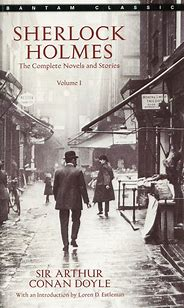This brings us to Hercule Poirot's companion, Captain Hastings, who says:
"'Obvious, my dear Watson,' I quoted lightly."
-Agatha Christie, "The Adventure of the Cheap Flat" IN Christie, Poirot Investigates (London, 1981), pp. 48-64 AT p, 51.
We are expected to notice that Hastings misquotes first because Holmes says, "Elementary," not "Obvious," and secondly because, although Holmes does say both "Elementary" and "my dear Watson," he never, in our hearing, says both together.
In these ways, all fiction can refer to all previous fiction. Thus, Poul Anderson refers to Shakespearean characters, Holmes, James Bond, Clark Kent, Huckleberry Finn, Sancho Panza, a Lensman and HG Wells. (I acknowledge that Wells is an author, not a character.)

1 comment:
Kaor, Paul!
Anderson shows us real characters from history in his Old Phoenix stories. "Losers' Night" presents us with Winston Churchill during his "wilderness" years, when his career was apparently ending in failure.
And I seem to be one of the few readers to recognize Queen Mary I in "Losers' Night"!
Ad astra! Sean
Post a Comment